Let's tackle our hair struggles together.
Hair Fall Queries?
Join our community to get answers to all your hair queries by certified hair coaches.
JOIN THE GROUPPlease download Telegram to become part of our community
Your cart(0)
Your cart is currently empty.
Your cart(0)

Air, water and the kind of food we eat, all of it impacts hair.
High stress levels can disrupt the hair cycle, leading to excess hair fall
Natural body imbalances can lead to thinning and increased hair fall
When your body isn’t functioning at its best, hair can become dry, weak, and prone to breakage
A diet lacking essential nutrients can slow down hair growth
TRAYA’S HOLISTIC PLAN FOR HAIR FALL
Our approach combines the goodness of three sciences. With ingredients from the most authentic sources, we personalize your solutions delivering assured results.
Take The Hair Test TMJoin us to break the hair loss myths and get the right information out.

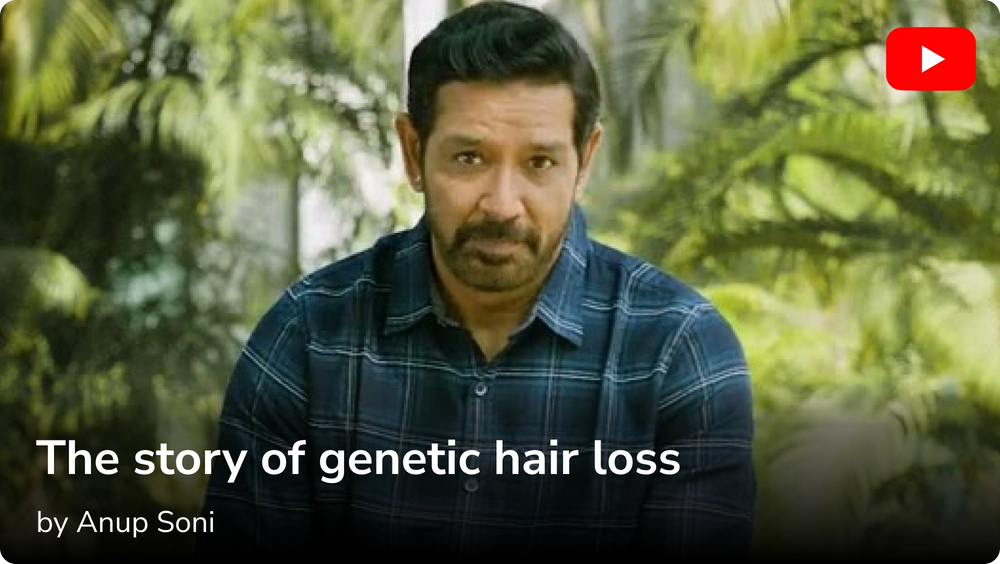
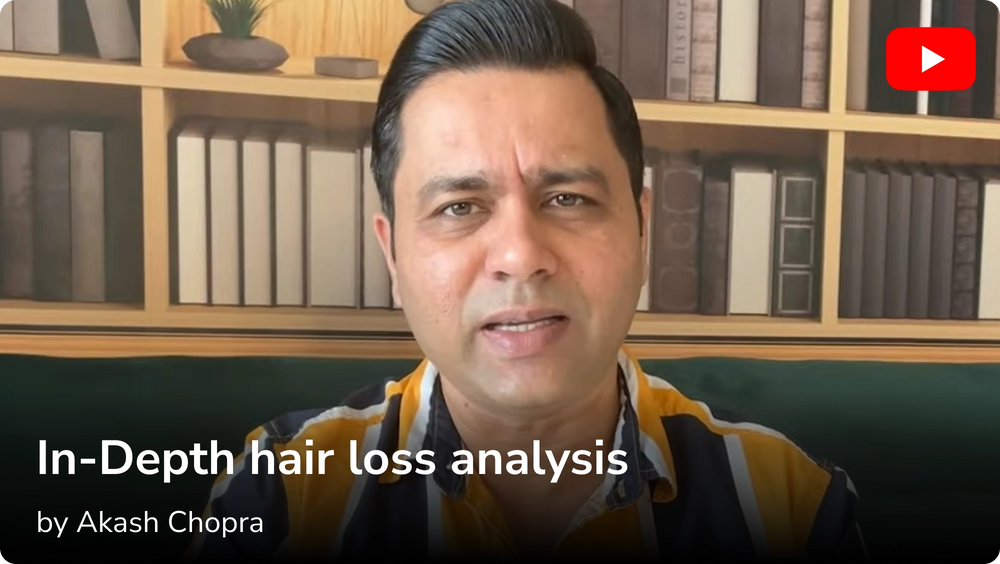
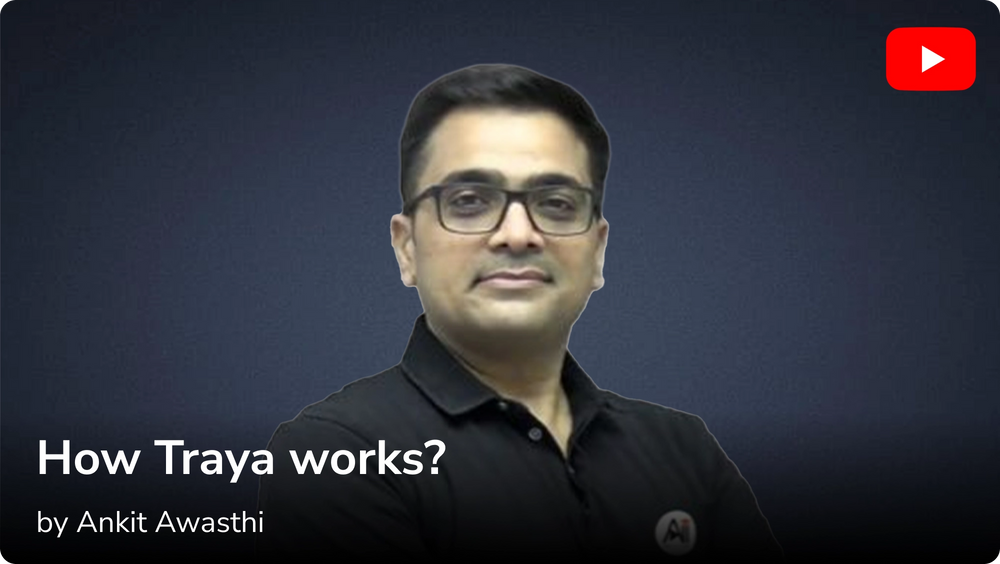
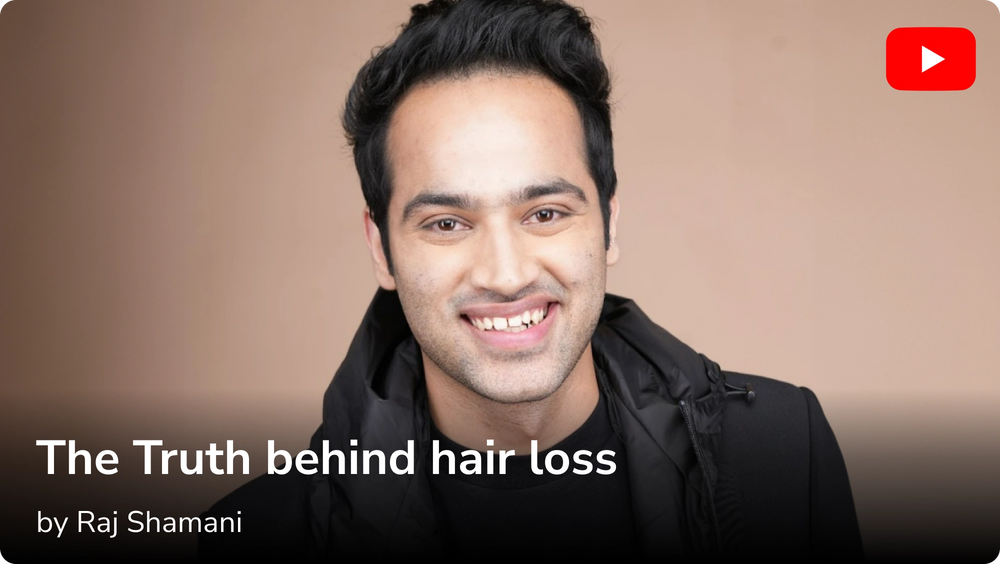
Let's tackle our hair struggles together.
Please download Telegram to become part of our community
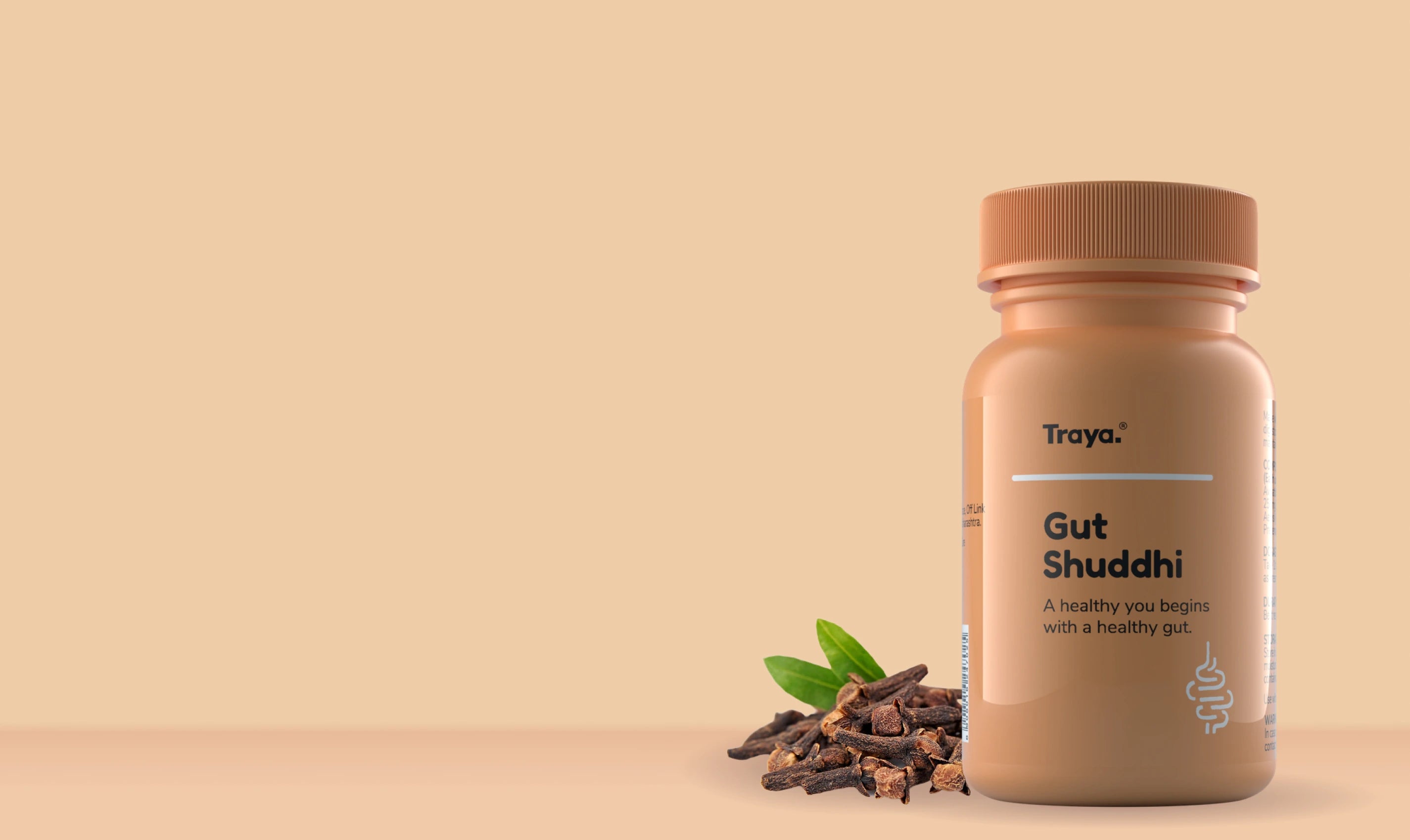
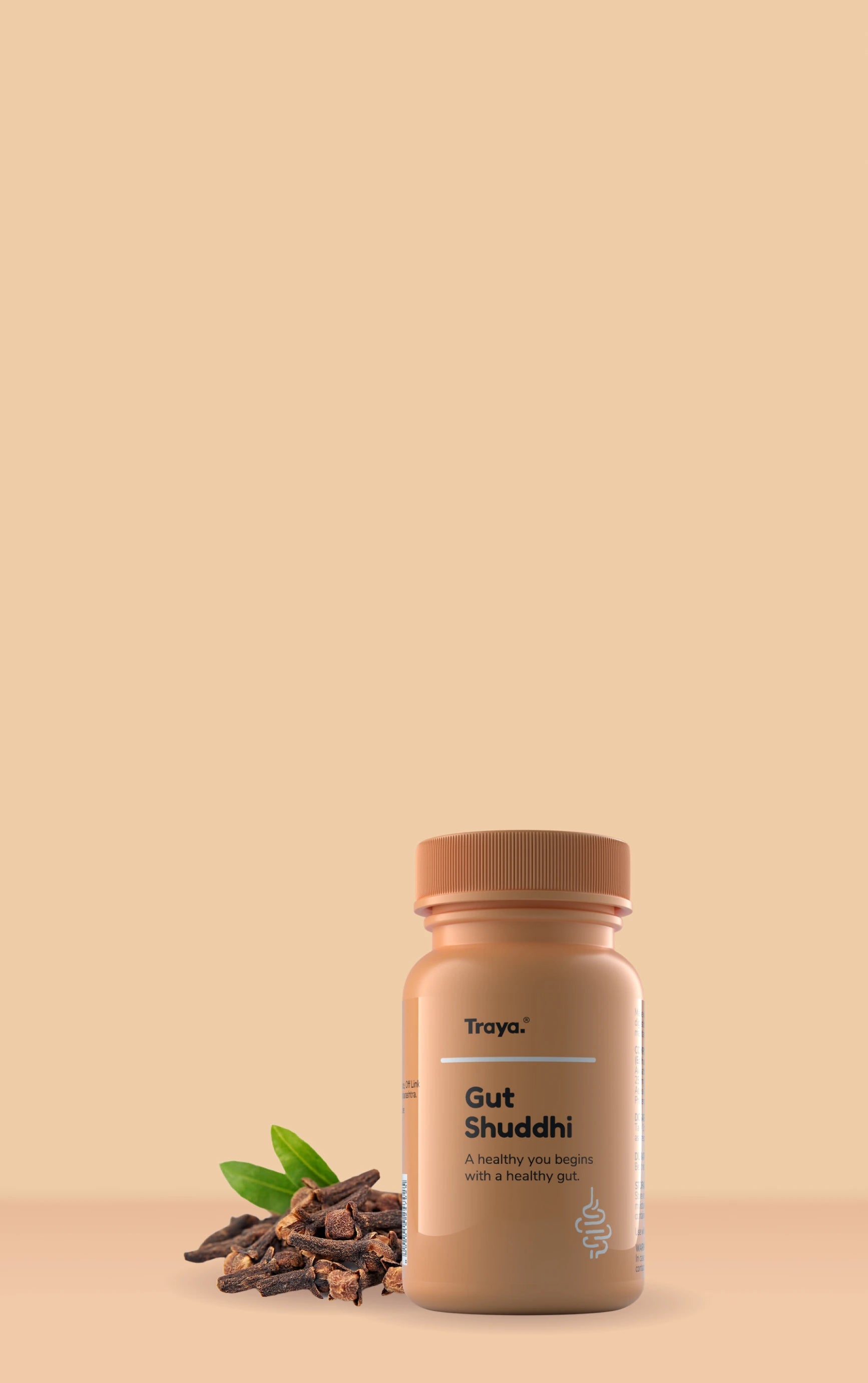
TRAYA 2X2 REGIMEN
Google Reviews
You’ve switched shampoos, tried oils, and maybe even taken a break from styling, brushing, or coloring. But the hair fall hasn’t stopped. Or worse it’s started getting into your head.
When dealing with hair loss, most people focus entirely on the outside: the scalp, the shampoo, the weather, and the water.
But what if the issue isn’t in your routine… What if it’s in your diet?
Hair is made of protein. It needs iron, B-vitamins, zinc, omega-3s, and micronutrients to grow, stay rooted, and thrive. And when even one of those is missing either from your meals or your ability to absorb them the first place it shows is often in the mirror.
At Traya, we’ve seen this story unfold again and again:
People with no visible scalp issues
Regular bloodwork (or so they thought)
A decent lifestyle, but…
Hair thinning, shedding, or breakage that just won’t stop
And more often than not, the missing link is internal nourishment.
It’s not about how much you eat.
It’s about what your hair is getting from what you eat.
In this guide, we’ll help you:
Understand how diet affects hair health with zero jargon
Learn the early signs of deficiency-based hair fall
Spot common eating patterns that quietly damage hair growth
Discover what a hair-friendly plate looks like (it’s not as complicated as it sounds)
And figure out whether your current diet might be working against your hair, not for it
No myths. No quick fixes. Just food, facts, and some science you wish someone told you earlier.
Hair is a cosmetic issue. But your body treats it very differently. To your system, hair isn’t essential for survival it’s more like a luxury. So when there’s a shortage of nutrients, guess what gets sacrificed first?
Your hair.
Let’s simplify how it works.
Every single strand of hair on your head is made of keratin, a protein built from amino acids. And for your body to keep producing keratin, it needs:
Enough protein in your meals
Good blood circulation delivers iron and oxygen to the follicles
A steady supply of micronutrients like biotin, zinc, and vitamin D
And the ability to absorb these nutrients properly, which means your gut health needs to be working too
If even one part of that chain breaks due to a poor diet, stress, or digestion issues your hair follicles start to struggle.
They don’t shut down immediately. Instead, they slowly shift into a resting phase, where no new hair is produced, and the already growing strands become weaker and fall out more easily.
This condition is called Telogen Efflux, and it’s one of the most common (and most overlooked) forms of hair loss. Unlike genetic hair loss, this kind of shedding is reversible once the right nutrients are restored.
Here’s the tricky part: many people eat three meals a day and still face nutritional hair fall.
That’s because:
Their diet is high in calories but low in nutrients (think white bread, sugar, caffeine, or processed snacks)
They eat the same 5–6 things every week, limiting variety
They don’t get enough bioavailable protein (especially vegetarians or vegans)
Their gut health isn’t supporting proper absorption (especially post-antibiotics, stress, or crash dieting)
So it’s not just about how much you eat. It’s about how well your food nourishes your hair consistently.
If your hair is falling more than usual, the first question to ask isn’t, “What shampoo should I use?”
It’s this: “Is my body getting what my hair needs to grow?”
Let’s examine the most critical nutrients for hair and what happens when the body runs low on them.
Hair is made almost entirely of keratin, a type of protein.
If your daily protein intake is too low, especially for weeks or months, your body slows down keratin production.
Common signs of protein deficiency:
Excessive shedding
Dry, brittle hair strands
Slower regrowth after cutting or hair fall
Good sources to include regularly:
Eggs, paneer, tofu, dals, milk, Greek yoghurt, chicken, fish, and nuts
Whey or plant-based protein powders (if food intake is insufficient)
Low iron is one of the most common nutritional reasons for hair fall, especially in women.
When iron levels are low, there isn’t enough oxygen reaching the follicles. Hair starts to thin, especially near the crown or parting.
Signs of low iron:
Hair fall that increases during or after your period
Feeling tired, pale, or lightheaded
Cold hands and feet, or dark circles under the eyes
Iron-rich foods (combine with Vitamin C for absorption):
Palak, methi, rajma, black chana, jaggery, and dates
Non-veg sources: liver, mutton, egg yolk
Cook in iron vessels to boost intake naturally
Vitamin D supports hormonal stability and immunity, which play a key role in healthy hair cycles. Vitamin B12 helps with red blood cell formation and energy metabolism, which impacts how well follicles repair and regrow.
What deficiency looks like:
Slower regrowth
Diffuse hair thinning
Low energy or frequent mood dips
Sources:
Vitamin D: sunlight (morning), egg yolk, fortified foods, mushrooms
B12: dairy, eggs, fish, meat vegetarians may need supplementation
Biotin (Vitamin B7) plays a role in keratin production and follicle regeneration.
Zinc supports scalp health, repairs follicles, and controls inflammation that can block hair growth.
Deficiency signs:
Weak, thinning hair that breaks easily
Itchy or flaky scalp despite no dandruff
Nails are also becoming brittle
Sources:
Biotin: nuts, seeds, egg yolk, banana, sweet potato
Zinc: pumpkin seeds, sesame seeds, dal, dairy, meats
Without healthy fats, your scalp becomes dry and tight, reducing blood flow to hair follicles. Omega-3s also help reduce inflammation that can worsen hair loss, especially in hormonal or autoimmune conditions.
Signs of deficiency:
Dry, itchy scalp
Hair that lacks shine or feels “lifeless”
Skin dryness or flaking around the hairline
Sources:
Flaxseed, chia seeds, walnuts, fatty fish (like salmon or sardines), avocado
Cold-pressed oils in moderation (like mustard, coconut, olive)
You might be eating home-cooked food. Three meals a day. Not dieting. So why is your hair still falling?
Because nutritional hair fall doesn’t always come from how much you eat. It often comes from how and what you eat, and how your body processes it.
Here are some of the most common food patterns we’ve seen in people with unexplained hair fall:
Cutting calories too aggressively whether to lose weight after a breakup or post-festive guilt deprives your body of basic building blocks like protein and iron. Even if the diet is short-lived, hair fall often occurs 6–8 weeks later, when the growth cycle is disrupted.
Your hair follicles are fed through your bloodstream, and if your body runs on caffeine or empty fuel for half the day, your hair is the last for nourishment.
If your meals revolve around the same 5–6 ingredients say roti, rice, potato, paneer, dal it limits nutrient diversity. Hair needs micronutrient variety, not just staple carbs.
Caffeine in large quantities can reduce iron absorption and increase cortisol (the stress hormone), impacting hair health over time.
Processed carbs and sugary snacks can cause insulin spikes and inflammation two things that damage scalp health and worsen hormonal hair loss (especially in PCOS or thyroid-related cases).
Many people lose hair after a gut-disrupting event, like a stomach bug, long medication course, or even post-COVID recovery. The body may not absorb nutrients properly, even if your diet is technically “clean.”
This one’s simple, but real. A dry scalp, slow nutrient transport, and general fatigue can all come from mild dehydration something most people don’t track unless they’re visibly thirsty.
Let’s clear one thing up: a hair-friendly diet isn’t about exotic superfoods, fancy smoothies, or cutting out entire food groups. It’s about giving your body what your hair needs consistently, and in forms your system can use.
Here’s what that looks like in daily life.
Hair is made of protein. So if your breakfast is toast, lunch is rice and sabzi, and dinner is noodles, your hair is already running low on raw materials.
Make sure you include protein-rich foods like:
Eggs, paneer, curd, tofu, dals, sprouts, lean meats, fish
Even mixing dal with rice or roti with nut butter can help increase amino acid quality
You don’t need massive changes just protein twice a day, every day.
For iron to be absorbed well, it needs to be paired with vitamin C.
Try:
Palak with lemon
Chana or rajma with tomatoes
Amla or oranges between meals
Cooking in an iron kadai (especially if vegetarian)
This is especially important for menstruating women, postpartum mothers, or anyone recovering from illness.
Fats aren’t the enemy. In fact, without enough dietary fat, your scalp may become dry and inflamed, and your body may struggle to absorb fat-soluble vitamins like D and E, both essential for hair health.
Simple, clean options:
Ghee (in moderation), cold-pressed oils, coconut, nuts, seeds, avocado
Don’t skip them, especially if your skin and hair feel dry or dull.
Your gut absorbs nutrients, directly affecting how well your hair grows.
Even a “perfect” diet might not help without a healthy digestive system.
Include:
Cooked vegetables (easier to digest than raw), fruits, and millets
Dahi, buttermilk, fermented rice or kanji for live cultures
Small habits here have significant, long-term payoffs.
Hair benefits from micronutrient diversity. That comes not from supplements, but from colour on your plate:
Greens (iron, magnesium)
Orange/yellow (vitamin A, carotenoids)
Reds and purples (antioxidants)
When possible, try to eat seasonally your body absorbs seasonal foods better, and they naturally support hormone balance.
A general hair-friendly diet works for most people. But in some cases, your body’s needs change and so should your nutritional approach.
Let’s look at a few everyday situations where hair fall may need extra dietary support.
Plant-based diets can be extremely healthy, but they also carry a higher risk of protein, iron, and B12 deficiency, which are closely linked to hair loss.
What to focus on:
Combine dals with rice or roti to improve the amino acid profile
Include tofu, tempeh, quinoa, buckwheat, and amaranth for diverse proteins
Add nuts, seeds, soy milk, and plant protein powders where needed
Consider B12 and iron supplementation after testing levels
Use lemon or amla with iron-rich meals to improve absorption
Even with variety, some nutrients like zinc and biotin can run low, so a blood test is always a good starting point.
Childbirth depletes key nutrients especially iron, calcium, and protein and many new mothers also experience appetite dips, fatigue, or breastfeeding-related restrictions.
Postpartum-friendly diet tips:
Add dry fruits, seeds, and dates to mid-meals
Focus on cooked, warm foods for easier digestion
Drink enough fluids, especially if breastfeeding
Ensure consistent iron and protein intake, even during exhaustion
Hair loss during the 3–6 month postpartum window is common. But when it's severe or prolonged, diet is one of the first things to evaluate.
Hormonal imbalances often lead to inflammation, blood sugar spikes, or slowed metabolism, which can impact hair density and regrowth.
What to prioritise:
Protein with every meal (to reduce insulin spikes and improve recovery)
Omega-3s and healthy fats (to lower inflammation)
Fibre-rich meals for gut and hormone regulation
Low-glycemic fruits, whole grains, and fermented foods
Reduce processed sugar and refined carbs wherever possible
In cases like PCOS or perimenopause, hair fall can persist unless both nutrition and hormonal health are addressed together.
After a strong viral infection, antibiotic course, or high fever, many people experience a phase of sudden hair shedding often called post-infectious Telogen Effluvium.
This happens due to:
Temporary nutrient depletion
Gut flora disruption
Emotional stress or poor appetite during illness
Recovery tips:
Start with gut-healing meals: khichdi, curd rice, vegetable soups
Gradually add protein, greens, eggs, or dals based on what feels digestible
Consider a probiotic course (consult a doctor first)
Prioritise sunlight, hydration, and sleep during recovery
You might be eating three meals a day. You might even feel like your diet is “healthy enough.”
But if your hair is falling more than usual, and everything else seems normal, this quick self-check can help spot the invisible gaps.
Answer these questions honestly. You don’t need to score yourself. Just observe.
Do you eat a visible protein source (eggs, paneer, dal, tofu, fish, sprouts, etc.) at least two meals daily?
Have you been avoiding animal products but not taking B12, iron, or plant-based protein support?
Did you go through a crash diet, intermittent fasting, appetite loss, or illness recovery that led to a visible weight drop?
Do you often rely on caffeine to skip meals or stay alert?
Do you eat the same limited foods every week, mostly carbs with little colour, variety, or texture?
Were you prescribed supplements you never finished or forgot to follow up on?
Do you often feel full too fast or bloated after meals?
Especially after meals, or first thing in the morning despite eating “enough”?
It’s likely that your hair loss has a nutritional component. However, it doesn’t mean that your entire diet is broken.
But it does mean your hair may not be getting the raw materials it needs and your current habits might be working against regrowth, even if unintentionally.
This is where a little clarity goes a long way and where a proper nutrition assessment can save months of trial and error.
Most people assume a dietitian will hand them a generic meal plan or tell them to "eat more protein." But when it comes to hair loss—especially the kind that doesn’t respond to shampoos or scalp treatments—the process is much deeper than that.
Here’s what a trained nutrition expert evaluates when someone reports ongoing hair loss:
It’s not about what you ate yesterday. It’s about your pattern over the last few months, especially:
Any weight loss (intentional or unintentional)
History of deficiencies (iron, B12, Vitamin D, calcium)
Meal timing habits (late dinners, skipping breakfast, long gaps)
Food variety (are you eating 20+ ingredients a week, or just 5?)
Hair falls usually reflect long-term depletion, not a single bad week.
Even if your food is perfect, poor digestion can block nutrient absorption.
Dieticians look for subtle signs like:
Regular bloating or gas
History of acidity or IBS
Long antibiotic use or recent infections
Low appetite or “full too fast” feeling
These issues can compromise how well your hair gets the nutrients it needs.
You could be eating right, but if your body is constantly stressed, it may be burning through reserves faster than you realise.
We assess:
Sleep quality
Caffeine intake
Physical recovery post-illness, postpartum, or intense work phases
Emotional fatigue or burnout
Stress doesn’t just affect your mind and your body’s ability to retain nutrients; hair is often the first place it shows.
Not all supplements are helpful; some may even interfere with absorption if taken incorrectly.
We ask:
What supplements you’ve taken before (and for how long)
If you’ve taken iron or calcium at the wrong time (a common mistake)
If you’ve stopped prescribed supplements mid-way
Whether any hair gummies or powders have been over-relied on without fixing your base diet
It’s not about adding more. It’s about targeting correctly.
Finally, nutrition needs change depending on where you are in life:
New mothers need a very different recovery plan than someone going through perimenopause
PCOS, thyroid, or autoimmune conditions require tailored anti-inflammatory diets
Vegans, athletes, and shift workers all have unique nutritional stress points
Personalised diet planning matters far more than general advice or reels claiming “5 superfoods for hair.”
At Traya, our nutrition assessments are designed to map all of this and connect the dots between your plate, your system, and your hair.
Getting your nutrition back on track isn’t about chasing perfection. It’s about making consistent choices that support your hair from the inside and noticing the small signals that healing has begun.
Use this weekly checklist to assess where you’re doing well… and where you might need to course-correct gently. No apps. No scores. Just real-life awareness.
Did I include a visible protein source in at least two meals per day?
Did I eat a mix of at least 10–12 unique ingredients this week (not just rice, dal, roti, repeat)?
Did I eat at least one iron-rich food four or five times this week (palak, chana, rajma, dates, etc.)?
Did I get enough water (at least 6–8 glasses/day, or more if breastfeeding)?
Did I include at least one tablespoon of healthy fats daily (ghee, seeds, cold-pressed oils)?
Was my digestion mostly regular (no persistent bloating, constipation, or gas)?
Did I eat slowly, mindfully, and without rushing most meals this week?
Did I include at least two servings of cooked vegetables or seasonal fruits daily?
If prescribed supplements (iron, B12, D3, etc.), did I take them consistently this week?
Did I follow through on results and recommendations if I had any recent tests (like iron or Vitamin D)?
Has the amount of hair fall reduced compared to last week?
Do I feel less fatigued or have brain fog than last month?
Am I noticing baby hairs or regrowth starting near the hairline or parting?
Do I feel less anxious or guilty about my eating habits this week?
Q1. Can food affect hair that much? Isn’t hair fall mostly genetic or hormonal?
Hair is influenced by genetics and hormones, but nutrition is what fuels the entire system.
Even if you have no family history of hair fall, a nutrient-poor or unbalanced diet can cause shedding, thinning, or breakage. And even with genetic or hormonal causes, a poor diet worsens things. Food doesn’t fix everything, but it forms the foundation.
Q2. How long does it take for dietary changes to improve hair?
Typically, it takes 6–8 weeks for your body to absorb nutrients consistently enough to impact hair growth. You may see reduced hair fall sooner sometimes within 3–4 weeks but visible regrowth and thickness usually take 3–4 months. Hair grows slowly. Progress starts from the inside.
Q3. Should I take supplements, or try to fix it with food alone?
Food comes first but in many cases, supplements are necessary to correct long-standing or severe deficiencies (especially iron, Vitamin D, and B12). A blood test is the best way to confirm what your body needs. Taking random supplements without understanding your levels can do more harm than good.
Q4. What if I already eat healthy, but I’m still losing hair?
“Healthy” is subjective. Many people eat clean, home-cooked meals but still:
Miss out on enough protein
Repeat the same foods daily
Struggle with absorption due to gut issues
Or eat in ways that don’t support their phase of life (e.g. postpartum, menopause)
If your diet looks healthy but hair fall persists, it’s worth digging deeper.
Q5. Is hair loss due to a poor diet reversible?
Yes in most cases. If the root cause is a nutritional gap or absorption issue, correcting it leads to visible regrowth over time.
However, the earlier you intervene, the faster and fuller the recovery tends to be. Long-term deficiencies may need more sustained care.
Q6. Can I follow a hair-friendly diet on a vegetarian or vegan plan?
Absolutely. But you may need to be more mindful about:
Protein quality (combine lentils, grains, soy, nuts)
B12 and iron intake (fortified foods or supplements if needed)
Adding variety to avoid micronutrient gaps
Planning ahead, mainly if you rely on convenience foods or have busy workdays
With a bit of intention, a plant-based diet can support strong, healthy hair.
Q7. I don’t want to obsess over food. Is there a simple way to start?
Yes start with three key shifts:
Add protein to two meals a day
Eat 2–3 colours of fruits/veggies daily
Cook with iron-rich or whole ingredients, not packaged ones
Small, sustainable changes beat perfect plans every time.
If you’ve seen yourself in any of these sections the skipped meals, the silent deficiencies, the unexplained hair fall despite trying “everything” then this wasn’t just a guide. It was your body trying to tell you something.
You don’t need to obsess over every bite. You don’t need to follow a perfect plan. But you deserve clarity and a way to support your hair from the inside out, not just from the surface.
Whether you choose to take the next step now or later, just remember. Hair fall isn’t always about products. Sometimes, it’s about nourishment. And that’s something you can fix.
The claims and results mentioned are based on multiple internal studies and customer research surveys that Traya has conducted with a statistically significant sample size of users who were under expert observation and guidance
93% saw results*
Traya conducted an internal study over both men and females facing hair fall and 93% saw results* after using the complete Traya solutions consistently for a period of 5 months. This study was conducted in December 2022.
Money back Guarantee
Traya’s 100% money back guarantee is valid only if you have been regular with the complete Customised plan for all consecutive months of your recommended period. Each customised hair kit is valid for only 30 days. If any individual has not seen any regrowth or control in hair fall, you can ask for a refund. However, once you apply for the money back guarantee, the team would then do a thorough check on consumer regularity based on every order date and then assign a qualified hair experts to determine eligibility . An exception to this policy is for those customers undergoing serious health conditions.
Traya’s Holistic 3 Science Formula
Traya’s 3 Science Formula is a synergistic mix of Ayurveda, modern science & Food Science designed specifically to cater to hair loss conditions stemming from multiple root causes. With lab tested ingredients and adaptogenic herbs, Traya’s Science-Backed formula clears internal blockages and boosts hair regeneration naturally. When blended with a healing dietary plan, it delivers great results in attaining long-term hair growth.
Traya Free hair test (™)
Traya’s Hair Dx test is powered by a proprietary algorithm to examine a user's hair & wellness profile. With the help of a distinctive image-capturing technique & experts- formulated examination, it is able to precisely analyze the type, stage & root causes of a certain hair loss condition.
8 lakh+ customers
Traya Free hair test (™) has been taken by more than 8 Lakh+ Customers - Data acquired from Traya customers.
Ayush Certified - Digest Boost, Cholest Vati and Consti Clear are Ayush Certified Products.
Traya’s Ayurvedic Products are based on natural and Ayurvedic formulations. These are completely safe for human use, but it is possible that certain ingredients may cause allergic reactions to some individuals.
Accurate hair diagnosis
The Traya free hair test (™) is a proprietary algorithm developed with the help of our in-house hair experts that provides Accurate hair and health diagnosis, provided you mention all the correct details about yourself. It gives a precise diagnosis about the type, stage and root cause of a specific hair fall condition.
Long Lasting Visible Hair Results
Traya’s complete "plan" gives visible and long-lasting results provided you’re on Traya’s hair maintenance kit. Since Traya works on the internal root causes of hair fall and hence our customers have seen long lasting results
Trusted by 70+ Hair Experts
Traya has been tried and loved by over 70 hair experts all over India to maintain healthy hair growth.
Award Winning Trusted Brand
India’s Healthcare Excellence initiated by Brands Impact has awarded Traya as the Most Effective Haircare Product of the Year 2022
Traya Women Santulan (™)
Traya’s Women Santulan is a unique technology that uses a combination of herbs treated in a specific manner (kalpa) to meet the bio-specific needs of women going through different stages of life. Santulan is a supplementary range to Traya’s 3 Science Formula which balances and nourishes the body inside-out delivering long-lasting hair growth results and overall health.
Hair Growth Plan starts at Rs 1699 pm* - The price mentioned is for a male of age 23 with stage 1 type hair fall based on the results of the hair test taken on the website. Prices may vary for individual customers depending on the results of the hair test and internal root causes
Hair Growth Plan starts at Rs 2000 pm* - The price mentioned is for a male of age 25 with stage 1 type hair fall based on the results of the hair test taken on the website. Prices may vary for individual customers depending on the results of the hair test and internal root causes